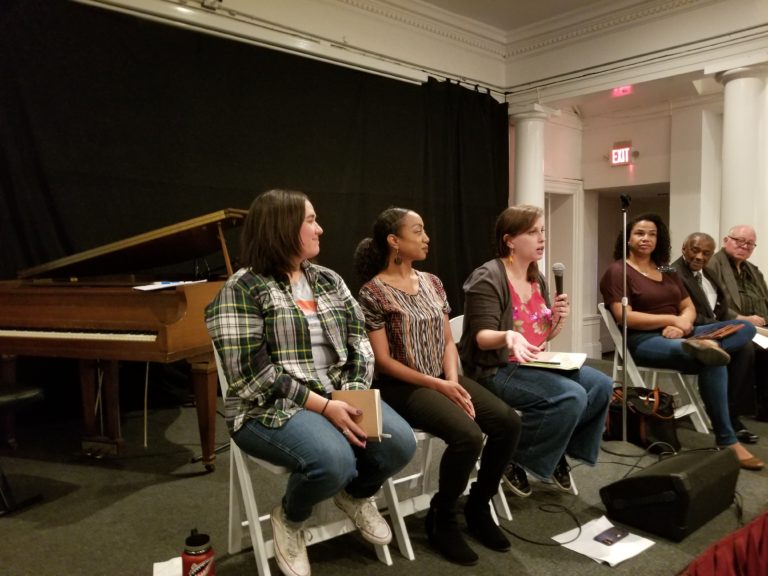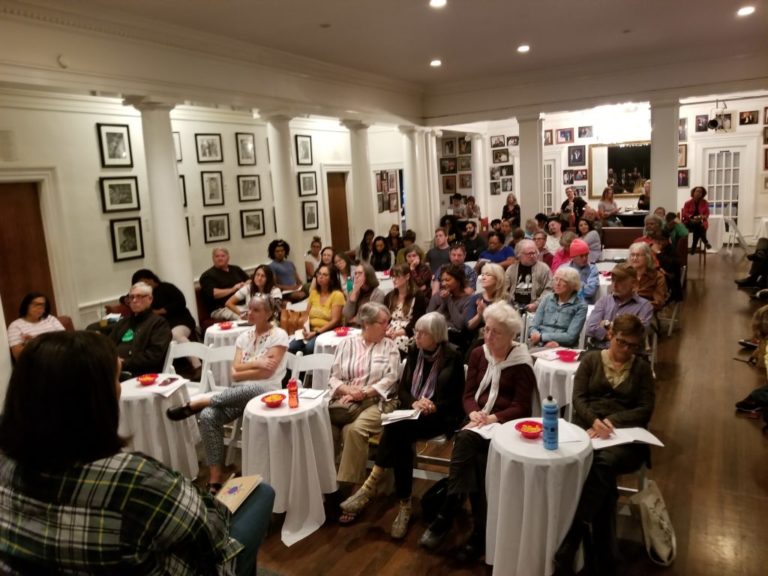Post Salon Backs Call on State Officials to Investigate and Remove FCMAT
Nov 7, 2019

By Ken Epstein
The Oakland Post Community Assembly, along with parents and teachers in the Oakland Not For Sale (ONFS) coalition, hosted a community discussion last Sunday aimed at opposing the school closures, austerity, and privatization that are threatening the future of Oakland public schools.
The gathering focused on ways to stop the closing of Oakland schools, carried out by the district under the guidance of a non-elected state-funded agency, the Fiscal Crisis Management and Assistance Team (FCMAT).
Attendees praised the Salon for providing rarely discussed information about the power and operation of FCMAT which began pressing the district to close schools at the time when the State took all power away from local residents in 2003 Then state administrator Randy Ward, working in tandem with FCMAT, asked an aide to find out how much money it would save to close schools. The aide returned a few days later with the information that closing schools does not save money, and Ward responded, “Then go back and find another reason for closing schools.”

The state-appointed FCMAT has continued to dominate school district decisions because of the unnecessarily large debt imposed on the district in 2003. FCMAT has at various times become the overseer to nine school districts. In every case, these districts were disproportionately Black and Latino, compared to the rest of the state.
OUSD has already closed 18 schools since the state took over in 2003, and 14 of those buildings have been taken over by charters. All of those schools served predominantly flatlands students. Other schools have lost classroom space as they have been forced to “co-locate” charters on their campuses.
This past school year, the district closed Roots International Academy and recently decided to close Kaiser Elementary and Oakland SOL. The district has committed to closing more schools over the next four years. There are 24 schools on the list of threatened sites, though OUSD has not revealed how many of them will be actually closed.
“The purpose of this salon is not to have an organized gripe session, a place to vent, but rather to take these concerns and convert them to a plan of action and a commitment to action,” said Oakland Post publisher Paul Cobb, who moderated the panel and the discussion that followed. . “The most important thing is that we need a community response and a political organizing response to put pressure for change,” he said.
Among the proposals raised by various individual participants was running a slate next year of four school board candidates who are committed to fighting for the community. Others proposed a recall of school board members. And others planned to set up a meeting with Oakland’s state legislators and Superintendent of Public Instruction Tony Thurmond to discuss the unfair aspects of Oakland’s debt and FCMAT’s actions.
Parents and teachers who are members of Oakland Not for Sale asked for the community to attend the next school board meeting to protest school closures and school board violence, Wednesday, Nov. 13, at 4:30 p.m. at La Escuelita Elementary at 1050 Second Ave. This meeting will give the community a chance to show that the community is not intimidated by the district’s use of police.
The first of the six panelists was Cherisse Gash, a parent from Kaiser Elementary, who said she attended Kaiser as a child and chose Kaiser for her child. “Without fail, the school did exactly did what they were supposed to do for my son. They loved him. They made sure he felt encouraged as a student.”
“We are going to fight for our schools,” she said. “We need board members that support students first.”
Another speaker was Roots teacher Quinn Ranahan, who fought to save her school. “It was a really beautiful place. I loved my kids. There was something that was really magical happening there.”
Central office administrators showed up last December to notify the school community that Roots would close in June. Ignoring its own community engagement policies, the board also ignored the hundreds of parents, teachers and students who protested at school board meetings voting on Jan. 28 to close the school.
Many Roots students were moved to schools that are slated to close next year. “Our kids will again be in an unstable environment,” Ranahan said.
Howard Elementary teacher Yael Friedman talked about how Francophone Charter had taken over part of her school. Under the co-location policy, it was given seven of the 16 classrooms at the school, forcing the Howard to move its reading intervention class to a closet.She said the teachers went to the school board meeting and showed them photos of the class being taught in the closet. “They said ‘Oh my goodness’ but then they said there was nothing they could do.”
While Howard is told it is losing classrooms because it is under-enrolled, parents report they try to enroll their children at Howard and are told by the district that there is no room, said Friedman.
Representing the Oakland Education Association (OEA) was Executive Board Member Kampala Taiz-Rancifer.
“OUSD has a long legacy of closing schools, primarily in Black and Brown and communities,” she said. “They’ve been intentionally defunding our schools. We’re going to need a new school board, and) we’re trying to figure out right now how to stop these really racist practices.”
Sylvester Hodges was President of the School Board during an earlier era, when the Board prevented State take-over. He said “You have to follow the money,” to see who will make money off school closures – the charter schools that want the campuses and the developers property to build upscale condominiums. The attack on public schools was well planned, he said. “They have supplied the district with all the necessary ingredients to ignore us, and do what they want. They have already sold themselves out.”
This reporter spoke about the role of FCMAT, which he observed while a school district employee during the state takeover in 2003 and later as a reporter.
With FCMAT in charge, along with State Receiver Randy Ward, the word around the district was that OUSD would be drastically downsized, “small enough to hold in your hands,” cutting something like 36 schools, compared to the over 90 school sites the district had at the time.
The salon adjourned after unanimously agreeing to work on various actions, including a meeting with state elected officials.